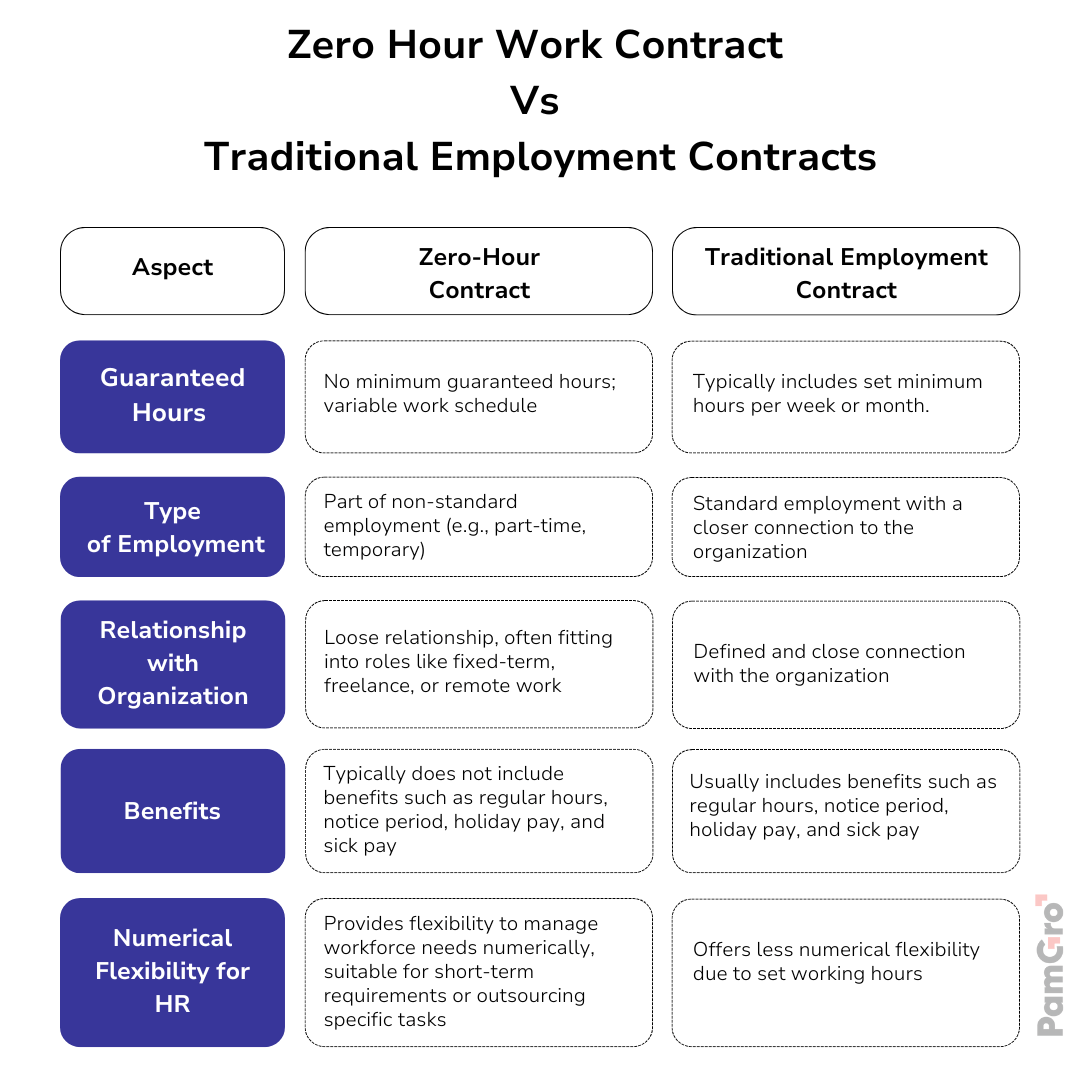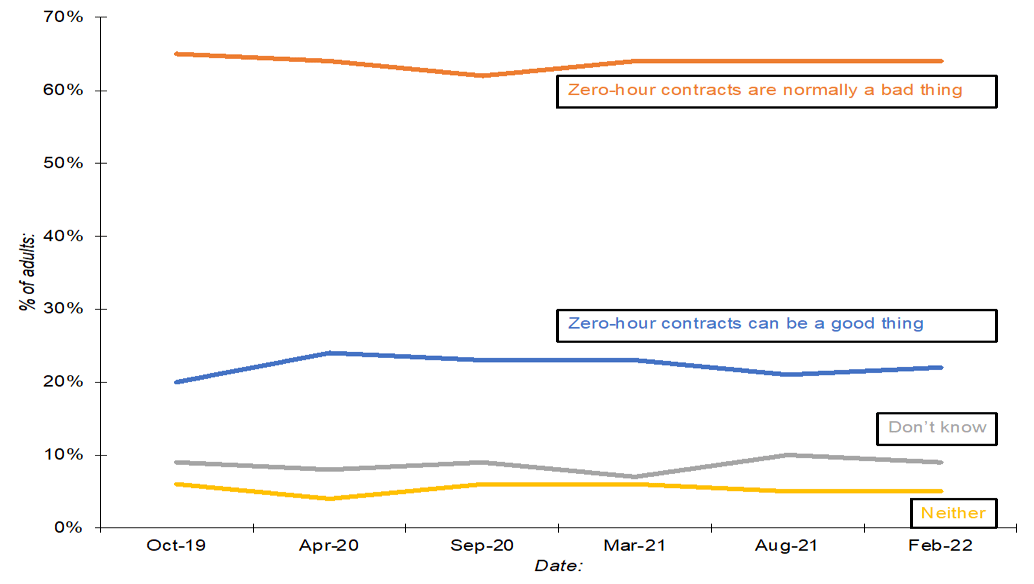In today’s U.K. job landscape, zero-hour contracts have emerged as a prominent feature, offering both employers and workers unparalleled flexibility. These contracts, increasingly prevalent across various industries, cater to the fluctuating demands of businesses while affording individuals the autonomy to dictate their work schedules.
In this article, we provide some useful information regarding zero-hour contracts, outlining their benefits and drawbacks to offer insight into this evolving employment model.
What is a zero-hours contract?
A ‘zero-hour contract’ refers to a contractual agreement between an employer and a worker where the employer is not required to offer a minimum number of working hours, and the worker is not obligated to accept any work that is offered. The employee has the option to enter into an agreement to make themselves available for work as needed, without specifying a specific number of hours or times of work.
Zero-hour contracts provide certain social security benefits such as maternity/paternity pay, holiday entitlement, and health insurance. It is important to note that a zero-hour contract may differ from casual work.
Certain countries, including Australia and the UK, allow for this particular type of employment contract, which is considered permissible under their respective employment laws.
In the UK alone, there were approximately 917,000 individuals employed under zero-hour contracts in 2021.
However, in New Zealand, the practice and use of zero-hour contracts has been prohibited due to the implementation of employment laws aimed at promoting fair employment practices.
What is the employment status of a zero-hours staff member?
In the UK, there is a legal distinction in employment law between a “worker” and an “employee”, with employees having more rights. Determining whether someone working under a zero-hour contract is an employee or a worker can sometimes be unclear.
However, even if the contract labels the person as a “worker”, courts have recognized an employment relationship based on the mutual obligations between the employer and employee.
Countries and their views on zero hours work contracts:
- United Kingdom: Zero-hour contracts are prevalent, with legal distinctions between “workers” and “employees” impacting rights.
- United States: Regulations vary by state, but zero-hour contracts are generally legal with some limitations.
- Canada: Similar to the US, regulations depend on the province, and zero-hour contracts are typically allowed with some variations.
- Australia: Zero-hour contracts are legal, but some minimum standards like reasonable notice for shifts might apply.
- Malaysia: Zero-hour contracts aren’t explicitly regulated, but there are legal requirements for standard working conditions that might apply.
- Singapore: The Employment Act doesn’t outlaw zero-hour contracts.
What are the similarities and differences of zero-hours workers with full time contractors?
Similarities
- No guaranteed minimum hours:
Zero-hour contracts do not provide a guaranteed minimum number of work hours per week or month, resulting in sporadic or no work opportunities for employees and no assured income.
- Flexibility for Employers:
Employers, on the other hand, have more control over scheduling work hours, allowing them to determine the timing and duration of employee availability, which benefits businesses with varying workloads.
- Lesser worker protection:
However, it is important to note that zero-hour contracts may offer fewer benefits and legal protections for workers compared to traditional employment contracts, potentially limiting paid time off, sick leave, or unemployment benefits.
Differences
- Regulation Levels:
The extent of regulation pertaining to zero-hour contracts differs greatly. Certain nations, such as the UK, permit them with minimal constraints, whereas others like Germany enforce more stringent regulations. In Germany, companies are obligated to provide either fixed working hours in a contract or a “work on demand” agreement that includes limitations to safeguard the rights of employees.
- Worker Benefits and Protection:
The level of benefits and protections provided to zero-hour workers may vary across different countries. For instance, in some countries, there may be requirements for minimum pay, paid leave, and even unemployment benefits for zero-hour workers. On the other hand, in the United States, the level of protections offered may be minimal, with benefits relying on state laws or employer policies.
- Tax Consequences:
Tax consequences for individuals with zero-hour contracts and their employers may vary depending on the country. Certain countries, such as Canada, may have distinct tax regulations for zero-hour agreements, which can affect the taxation of workers and the payroll procedures of employers. In contrast, in other countries, the tax treatment may resemble that of standard employment contracts.
What are the employment rights of zero-hour contract workers?
Despite the term “zero-hour” suggesting a lack of entitlements, zero-hour contract (ZHC) workers do have certain rights under the law. The extent of these rights hinges on their classification as either employees, workers, or self-employed individuals. Typically falling under the category of workers, those engaged in ZHCs are entitled to fundamental protections such as
- paid annual leave and
- compliance with the national minimum wage (NMW).
Moreover, these workers are shielded from discrimination, enjoy other statutory employment rights and the privilege of rest breaks, and may qualify for pension auto-enrolment given specific criteria. However, for those classified as employees, a broader spectrum of rights is accessible. These include:
- avenues for claiming unfair dismissal,
- eligibility for maternity/paternity leave, and
- entitlement to redundancy pay.
It’s noteworthy that employees under ZHCs are often obligated to accept offered work, while workers retain flexibility in choosing when to accept assignments.
Previously, ZHCs could restrict employees or workers from seeking alternative employment, but since the implementation of the full exclusivity clause ban in 2015, individuals under such contracts are free to pursue additional sources of income. This legislative measure aims to afford ZHC workers the opportunity to sustain themselves economically by engaging in supplementary employment if necessary.
Customer Success Story
Discover how an IT services company achieved a 25% reduction in recruitment costs while improving efficiency with PamGro.
Advantages of zero-hour work contracts:
For Employers;
- Flexibility
During periods of low demand, it may pose a challenge to hire permanent staff. Zero hour contracts provide employers with the adaptability to recruit staff based on the specific requirements of their business, enabling them to promptly and efficiently adjust to any changes that may arise.
This is particularly advantageous for businesses that experience seasonal fluctuations, as it allows employers to manage staffing needs during busy and slow periods. Additionally, zero hour contracts empower employers to effectively address issues like employee absences and unexpected circumstances.
- Savings in expenses
By not obligating employees to fixed hours and having the flexibility to change scheduled hours with short notice, zero hour contracts provide significant cost savings for employers. They only need to compensate their staff for the actual hours worked, without incurring additional expenses like employee benefits.
Moreover, zero hour contracts present a more economical option compared to hiring agency workers, as it eliminates the need to pay commissions and agency fees.
For Employee;
- Flexibility
Zero hour contracts provide workers with the freedom to choose their working hours based on their own schedule, allowing them to balance other responsibilities such as caregiving, studying, or holding multiple jobs.
- Supplementary Income
Individuals with full-time jobs can benefit from the flexible nature of zero hour contracts, as they provide an opportunity to earn supplemental income without any imposed restrictions.
- Stable Work
Stable employment prospects are available due to the flexibility of zero hour contracts. This provides an opportunity for individuals without prior experience to enter the workforce, gain valuable industry knowledge, and integrate into a company’s environment, potentially leading to a long-term position within the organization.
Disadvantages of zero-hour work contracts:
For Employers;
- Risk of Misclassification
Companies often hire employees to meet various needs, leading to the establishment of both full-time and contingent workforces. Individuals may be recruited for specific tasks or projects with predetermined durations, such as independent contractors, consultants, freelancers, or other outsourced workers on a per-job or fixed contract basis.
Determining the correct classification for zero-hour employees can be challenging for many employers. Incorrectly categorizing these employees as contingent workers or full/part-time employees can lead to penalties, legal and tax consequences, and even potential imprisonment.
- Payroll Complications
Zero hour contract employees have the same entitlement to holiday pay and annual leave as their counterparts. Nevertheless, complications may arise in terms of payroll, as employers must determine the employee’s holiday entitlement. This can become intricate when the employee works irregular hours, potentially resulting in disagreements and disputes.
Typically, holiday pay entitlement for zero hour contract employees is calculated on a pro-rata basis, taking into account the hours worked.
- Lack of Certainty
Zero hour contracts provide employees with the freedom to accept or decline work without any obligation to inform the employer in advance. This level of flexibility can pose challenges for employers, as it may result in understaffing or the need for sudden recruitment.
For Employee;
- Income Insecurity
Due to the absence of guaranteed hours in a zero hour contract, employees may face challenges in maintaining income security and managing their finances due to the unpredictable and fluctuating nature of their earnings.
For instance, an employee on a zero hour contract may work a full 40-hour week, only to be left without any work the following week due to limited available shifts. Additionally, these employees typically earn lower hourly wages compared to those on more conventional employment contracts, such as indefinite term contracts.
- Risk of Unfair Dismissal
While employees on a zero hour contract do have the ability to file for unfair dismissal, it can often be challenging to provide evidence when an employer opts to reduce an employee’s hours to zero instead of terminating their employment.
- Undue Pressure
In a zero hour contract, employees are not required to accept any offered work. Nevertheless, there is a possibility that employees might feel compelled to accept the proposed hours due to the concern of not being offered work in the future.
Additionally, there is a potential fear of facing consequences from their employer if they decide not to accept the work that is offered to them.

Why are they criticized?
Companies have faced criticism for exploiting their staff through the use of these contracts. In certain instances, workers are denied shifts as a means of punishment for alleged poor performance or for rejecting previous shift offers.
Some employers have even reduced the number of hours assigned to workers in order to avoid going through a formal redundancy process. Additionally, certain companies require workers to accept proposed shifts, thereby eliminating any mutual flexibility.
Workers are deprived of the same protections afforded to employees, such as sick pay, holiday pay, and job security, despite being burdened with similar obligations. For instance, some workers are prohibited from seeking employment elsewhere. There have been occasions where workers have been called in to work, only to be asked to wait for an hour and then sent home without receiving any payment.
Following this criticism and backlash countries have either banned zero-hours contracts, or heavily regulate their use, including New Zealand, Italy, France, Germany, the Netherlands, Ireland, Finland, and Norway.
The following graph shows the attitude of people in the UK for these contracts which was gathered by CIPD, the professional body for HR and development.
The graph shows that approximately 70% of the people do not feel good about these types of contracts.

Payroll Solutions Unrivalled since 15 Years









